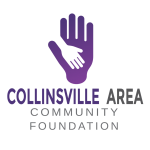 Collinsville, IL – December 10, 2021 – The Collinsville Education Scholarship Foundation has announced a transition to include additional scholarship opportunities and community projects under a new umbrella organization: Collinsville Area Community Foundation.
Collinsville, IL – December 10, 2021 – The Collinsville Education Scholarship Foundation has announced a transition to include additional scholarship opportunities and community projects under a new umbrella organization: Collinsville Area Community Foundation.
The Collinsville Education Scholarship Foundation (CESF) was established in 2010 for the purpose of “…raising funds and accepting and disbursing contributions, gifts, and bequests from individuals, groups, or businesses to support education scholarship opportunities and experiences for high school students who reside in the corporate limits of the City of Collinsville.”
History of the Collinsville Education Scholarship Foundation
CESF was the vision of former Collinsville Mayor Stan Schaeffer. Schaeffer, who was a retired educator, was inspired by “Promise” organizations in other communities that provided scholarships for local graduates. Following Schaeffer’s sudden death in 2008, City leaders made the Collinsville scholarship program a reality and set the course for its community-based focus.
“Stan believed an investment in Collinsville youth through educational scholarships would elevate the quality of life for everyone,” said current Collinsville Mayor John Miller. “Over the past 11 years, we have raised more than $100,000 in funds and sent 46 students off to college knowing their community believes in them.”
Broader Scope of the New Collinsville Area Community Foundation
Collinsville Area Community Foundation (CAF) will expand the original organization boundaries beyond the City of Collinsville to include all communities within the area defined by Collinsville Community Unit School District #10 (CUSD 10) and allow resources to fund initiatives apart from scholarships.
“The new CAF allows opportunities to be realized for the community beyond scholarships to college,” said Collinsville City Councilman Donna Green. “The enhanced scope of the foundation allows us to include projects and programs that move the community forward.”
Collinsville City Manager Mitch Bair added, “Examples of community projects that can benefit from the CAF include the redevelopment of the sports complex, a community recreation and event center, as well as expanded opportunities in parks and open spaces. Opportunities presented to the community through this foundation are truly limitless.”
Local business owner Kai Redmon of Redmon Insurance Agency has served as president of the CESF board since 2010 and is currently overseeing the organization’s expansion into an areawide community foundation.
“The Collinsville Education Scholarship Foundation has disbursed $46,000 in merit-based scholarships to Collinsville residents since its inception,” said Redmon. “As the years have passed, we’ve started to see additional opportunities to make a difference in our community through scholarships to benefit a wider range of students and other projects to improve the quality of life.”
CESF was organized as a charitable organization as defined by Section 501c(3) of the Internal Revenue Code. All contributions and gifts are 100% tax deductible.
“We will continue our original mission to give scholarships to students who live in the City of Collinsville, but moving forward our 501c(3) will be able to receive funds that will provide scholarships and other opportunities for residents throughout the greater Collinsville community,” said Redmon.
New Collinsville CUSD 10 Scholarships & Initiatives to Benefit from Foundation
The recently announced Collinsville CUSD 10 Kahoks Teaching Kahoks scholarship program is the first new addition to fall under the CAF umbrella.
“Our district has the opportunity to encourage future high school graduates to choose education as a career, return to the school district they graduated from and influence future generations, while raising their family and making Unit #10 their home,” said Collinsville CUSD 10 Superintendent Dr. Mark B. Skertich. “This is an opportunity we cannot pass up and we are grateful for the partnership with the CAF and the impact it will have on not only our school district, but communities for years to come.”
“The level of financial support we are receiving for the Kahoks Teaching Kahoks initiative requires a long term investment strategy to ensure the program is self-sustaining. The new CAF focus allows contributions from alumni, community members and local businesses to be invested and grow over time, establishing a sustained scholarship program that provides ample opportunities for current and future graduates to pursue a career within our school district,” said Skertich.
In coming weeks, additional new scholarships for local career and technical education students at Collinsville Area Vocational Center (CAVC) will be announced.
“The updated scope of the CAF will allow us to develop many different ‘buckets’ of money to support new scholarships and community projects. The CAF will serve as the umbrella to all of the buckets and allow us to work with business leaders and community partners to develop new opportunities for the students and communities served by CUSD 10,” said Collinsville Area Vocational Center Director Joe McGinnis.
“We have only scratched the surface on the benefits of an active partnership between the school district and our communities. We are excited about future opportunities,” said Superintendent Skertich.
For More Information or to Support the CAF:
To support the foundation and the future projects it supports, donations can be made to: Collinsville Area Community Foundation, 125 S. Center Street, Collinsville, Illinois, 62234. For more information, contact Collinsville City Councilman Donna Green (dgreen@collinsvilleil.org / 618-346-5200 ext 1161) or CUSD 10 Superintendent Dr. Skertich (bskertich@cusd.kahoks.org / 618-346-6350.
The Collinsville Area Community Foundation (CAF) works to enhance the quality of life for the communities of Collinsville, Maryville, Caseyville, Fairmont City and surrounding areas by promoting impartial, unbiased and ethical philanthropy, with a commitment to inclusiveness and diversity, by bringing together people and resources that identify and address present and emerging school and community needs.